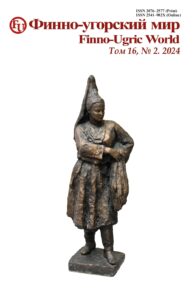Download 02-2024 (pdf, 5,18 Mb)
PHILOLOGY
Nekrasova G. A. Adaptive Features of the Russian Noun Pluralia Tantum in the Komi-Permian Language
Mosina N. M. Verbs of Thinking Activity in Erzya and Finnish Languages: Semantic Aspect
Sheyanova S. V. Proper Names in the Poetry of Marina Slugina
HISTORICAL STUDIES
Chebakovskaуa A. V. The Protection of Childrenʼs Health in Karelia in the Early 1920s
Kornishina G. А. Fire in the Ritual Culture of the Mordovinias: Origins, Traditions, Scope
CULTURAL STUDIES
EVENTS, PEOPLE, BOOKS
Idiatullov A. K. A New Book on the Ethnoconfessional Situation in the Republic of Mordovia






















